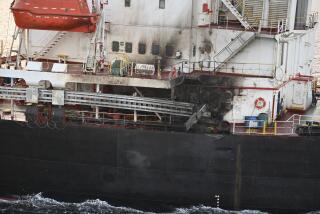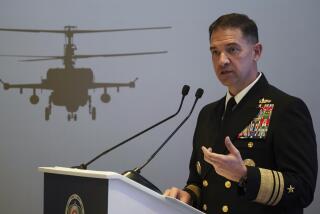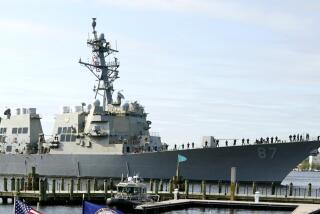2 Allies to Join Sweeping of Gulf : Further Mining in Area Cited as Britain, France Reverse Policy
- Share via
LONDON — In a major policy reversal, Britain and France announced plans Tuesday to send minesweepers to the troubled Persian Gulf region as quickly as possible.
At a crowded afternoon news conference, Britain’s Defense Secretary George Younger said that Britain will send four of the world’s most modern minesweepers to reinforce Royal Navy ships already protecting British commercial vessels passing through the Strait of Hormuz.
“News of further mining in the gulf area over the last 48 hours shows that a new situation has arisen there,” Younger said, explaining his government’s change of mind. The British government had turned down a formal request for minesweeping help from the Reagan Administration just 11 days earlier.
France Follows Suit
Less than an hour after Younger’s news conference, France announced that it will dispatch two minesweepers to reinforce a four-ship task force currently steaming toward the Persian Gulf.
French Defense Minister Andre Giraud, speaking on television in Paris on Tuesday evening, also mentioned the discovery of mines outside the Strait of Hormuz as the main reason for the French reconsideration.
“We took the same decision as the British, evidently for similar reasons,” he said.
Giraud, whose government also had rejected a request for help from the United States, said the French decision had been taken without consulting with the United States.
The French and British announcements came less than 24 hours after a tanker owned by a Texaco Oil Co. subsidiary, carrying a load of Iranian crude oil, hit a mine in the Gulf of Oman, south of the Strait of Hormuz. The area had previously been considered well outside the danger zone from the almost seven-year-old war between Iran and Iraq.
Not to Aid U.S.
Both Younger and Giraud stressed that their minesweepers will be used only in connection with their respective naval task forces in Middle East waters and will not be offering assistance to any U.S. Navy vessels escorting shipping in the northern reaches of the Persian Gulf near Kuwait.
“Our mission is different than the mission of the Americans,” Giraud said.
The Royal Navy already has three warships escorting British-registered merchant shipping in the gulf, and France dispatched the carrier Clemenceau and three support ships on July 30, about two weeks after it broke off diplomatic relations with Iran in a dispute over its demand to question an Iranian Embassy employee about terrorism.
French defense officials have been deliberately vague about the task force’s mission, stating only that it is meant to “protect French interests in the Mediterranean and the Indian Ocean.” The ships were reported Tuesday to be in the Gulf of Aden, at the southern end of the Arabian peninsula.
Younger said the British minesweepers, together with a support vessel, will sail from English ports in about a week and will take an additional four weeks to join the existing British force.
The British minesweepers are said to be among the world’s best equipped. They were built in the late 1970s and early 1980s and are capable of hunting mines with sonar or with the more conventional “sweeping” technique using a tow wire.
U.S. naval forces were found to be critically short of minesweeping capability after the Bridgeton, a Kuwaiti supertanker re-registered as an American ship and being escorted northward through the gulf, was damaged by a mine July 24. The United States has only three ocean-going minesweepers in operation and had been relying mostly on its minesweeping helicopters and Saudi Arabian vessels to combat what was thought of as a limited mine threat.
Although the British and French minesweepers will not be directly supporting the U.S. Navy, the decision of both countries is expected to provide an enormous psychological boost to the American efforts in the region.
Less than two weeks ago, the rejections by France and Britain were matched by similar responses from the Netherlands, Italy and West Germany, leaving President Reagan seemingly isolated among Western allies in his policy of protecting shipping to assert the right of free navigation in international waters.
Although ships from the three navies will be operating in different areas, Tuesday’s action has signaled a British and French willingness to increase their commitment to the same basic principle that the President says he is upholding.
In Washington, Administration officials hailed Britain’s and France’s action.
Defense Secretary Caspar W. Weinberger said he was “very pleased” and White House spokesman Marlin Fitzwater said the announcement was welcome.
Noting that Weinberger has called for creation of an international minesweeping force, Fitzwater said: “Great Britain’s generosity in showing leadership in that area (means) I think it’s possible that we might see some other countries join them in the days ahead in helping with that problem.”
After announcing the British decision, Younger called on other nations to assist in keeping international sea lanes free.
“We strongly support the idea that other nations should play their part in keeping the high seas open to peaceful traffic,” he said.
Britain first assigned a small naval force to shepherd British-owned vessels through the narrow Strait of Hormuz in October, 1980, a month after the Iran-Iraq War broke out, but it has never ventured beyond the island nation of Bahrain, about one-third of the way up the Persian Gulf.
“That won’t change,” said Adm. William Stavely, First Sea Lord of the British Admiralty.
Stavely said there will be no joint operations of any kind with the U.S. fleet inside the Persian Gulf. He said the two navies have exchanged some oil and other supplies on previous occasions, but only outside the gulf.
Extra Mining
Prime Minister Margaret Thatcher’s government had initially concluded that sending minesweepers to the region would only escalate tensions and possibly trigger an expansion of the mining of main shipping lanes by Iran or Iraq.
However, Monday’s damage to the Texaco tanker near the United Arab Emirates port of Fujaira, south of the Strait of Hormuz, led Thatcher to conclude that the extra mining was already taking place. The mine, and additional ones found Tuesday, were the first sighted in the area where the British naval ships are patrolling.
Younger said the mine appeared to have been “a properly laid, properly tethered mine and therefore someone must have laid it.”
“We have no evidence who that was,” he added.
Times staff writer Stanley Meisler, in Paris, contributed to this article.
More to Read
Sign up for Essential California
The most important California stories and recommendations in your inbox every morning.
You may occasionally receive promotional content from the Los Angeles Times.










